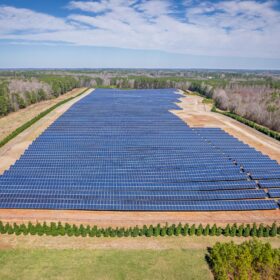Kit Carson hits its solar goal a year early
The electric co-op is en route to meeting 100% of its daytime energy load entirely with solar generation after securing financing for 21 MW of solar and 15 MW of storage.
New Mexico gains a community solar program
The state’s governor signed Senate Bill 84 into law, paving the way for a statewide community solar program in 2022 that includes a 30% capacity carveout for low-income people and service organizations.
New Mexico bill would set up a statewide community solar program
SB 84 would establish a 100 MW community solar program and also include a 30% annual capacity carve-out for low-income customers and related service organizations.
Solar+storage project underway at New Mexico State University
“The major benefit is that we’ll be able to receive power during the noon-to-early-evening window, usually when the energy demand is at its peak,” said an NMSU official.
Morning Brief: Consumers Energy expands its net metering cap, Nautilus closes a financing commitment
Also in the brief: A New Mexico regulator has recommended denial of El Paso Electric’s planned expansion of the Newman Generating Station, Gemserv has launched a digital platform aimed at helping businesses transition to electric vehicles and more.
Morning Brief: Ameren Illinois chairman, ‘Our position on net metering credits has not changed’
Also in the brief: Nefarious deeds at the DOE — blocking yet another study favorable to renewables. The North American Energy Resilience Model joins the Seams study as a victims of agency bias.
Array Technologies’ share price up 65% on first day as a public company
The IPO priced at $22, above the top of the anticipated range of $19 to $21 — valuing the solar firm at about $2.8 billion.
IPO update: Solar tracker builder Array Technologies increases number of shares in largest PV IPO of 2020
The reception in the financial community on the eve of the Array Technologies IPO must have been enthusiastic.
Solar-plus-storage replaces coal plant in New Mexico, makes carbon-capture retrofit moot
The utility is planning on replacing the San Juan coal-fired station’s 847 MW of capacity with 650 MW of solar generation and 300 MW/1,200 MWh of accompanying energy storage. The new plan all but kills a proposal from San Juan’s owner and the City of Farmington to add a carbon-capture retrofit to the station.
Solar tracker builder Array Technologies sets its terms in largest solar IPO of 2020
Profitable solar tracker company Array Technologies is going public the old-fashioned way and eschewing the SPAC method being employed by other renewable companies such as QuantumScape and ChargePoint. Did we mention the company was profitable?













